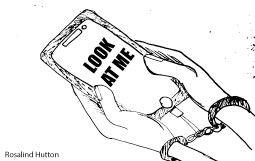Do you use multiple tabs on your computer or phone? How often do you cycle through your music, skipping rapidly to find the one song which fits the moment?
I am guessing you frequently check your phone like a spare appendage, growing irritable whenever the charge runs low.
While many feel they can handle their decimated attention spans, some are beginning to notice a disturbing pattern. There is a major drop in the length of everyone’s focus, especially now that technology is involved in every facet of our lives.
Anyone can claim they can quit mindlessly surfing whenever they want. Some noticed stopping is not particularly easy, so they decided to foster a community to help others curb their addiction.
Nik Kochath of No Surf argues mindlessly browsing the internet leads to a loss in dopamine production. The claim alleges by being over-stimulated with online media, our brains cannot provide adequate happiness levels from digital material. Fleeting moments of joy warp into long sessions of endless scrolling, all in the pursuit of something better, which is rarely found.
Naturally, one community does not speak for the entirety of the human population, let alone the global internet. Advancements in technology like wireless-interlinking (Wi-Fi), video sharing with YouTube and Twitch, or even search engines like DuckDuckGo and Google foster endless communication around the globe.
Our lives would be far less interesting without the internet, but our attention spans might be paying a hefty price.
Have you been able to get through a novel recently without growing tired by the length? Can you maintain eye contact with another person for more than a few short moments? How about those pestering messages following videos which beg for your subscription and feedback?
There is certainly less attention to go around, but the lack of interest is not the culprit.
Countless studies have been conducted to test this theory, including one published last year in the Asian Journal of Psychiatry. According to BMC Public Health, internet addiction was tested in over 550 young Vietnamese men and women. Over 20 percent were classified to be addicts. This is one out of five, going past a hundred individuals in the tested group. Evenly split between men and women, their age group was between 15 to 25.
Participants with internet addiction were more likely to have problems with self-care, difficulty in performing their daily routines and they tended to suffer from anxiety and depression. The impact toward older and younger generations is still to be determined, but their reliance is practically assured by the bulk of humanity.
Everyone is entitled to use the internet as often as they desire. How often they find themselves looking around is the real question. Procrastination is far easier with the endless distractions of their online feed.
With countless options like message boards, streaming services and blog posts all clamoring for your attention, the impact has slowly eroded fixation ability, chiseled away like a slab of marble, leaving behind a pile of dull rock and random debris. Rebuilding your mind to avoid distraction is possible, but it will take far longer to return to “normal” once the damage is done.
Categories:
Internet addiction is plaguing humankind

Internet addiction is plaguing humankind
About the Contributor

Brandon Grisham, Former Online Editor
Brandon Grisham served as the Online Editor from 2019 to 2020.
He also started The Reflector’s digital archive, dubbed the “Grisham Archive Project.”
0
Donate to The Reflector
Your donation will support the student journalists of Mississippi State University. Your contribution will allow us to purchase equipment and cover our annual website hosting costs.
More to Discover






